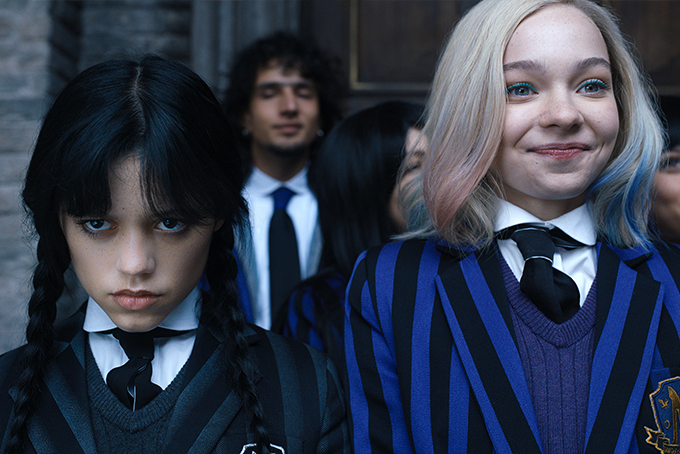It seems like Netflix’s Wednesday is everywhere these days. But amidst viral TikTok challenges inspired by Wednesday’s iconic dance at the Rave’N and behind-the-scenes clips of how scenes with Thing were filmed, a deeper conversation has surfaced. In the weeks following the show’s meteoric release, the neurodivergent community online has pointed out how the most recent iteration of Wednesday Addams, brought to life brilliantly by Jenna Ortega, seems to be highly autistic-coded.
Across video essays on YouTube and long detailed Twitter threads, autistic people have wholeheartedly embraced the macabre daughter of the Addams clan, laying out the various ways in which she seems to exhibit familiar traits and go through the same experiences that many autistic people do.
Perhaps the most recognisable original example of the Weird Girl in media, Wednesday Addams is only one of many such characters neurodivergent individuals have felt a strong connection with. While the trope has long been beloved by people who feel like they don’t fit in, it is the neurodivergent community, in particular, that has deeply resonated with these characters.
“Wednesday functions on a different wavelength than her peers—a defining hallmark of the neurodivergent experience for many”
Amongst all female character types, the Weird Girl stands out as the black sheep. In Wednesday, Wednesday Addams begins the series as the outsider even in a school meant for outcasts. She seems to function on a different wavelength than her peers—and for many neurodivergent people, this is one of the defining hallmarks of the neurodivergent experience. That’s not to say that characters under the Weird Girl trope are neurodivergent—because it’s impossible to diagnose fictional characters for certain, since diagnosis is a complex process that takes into account a multitude of factors beyond what a piece of media can provide. But it remains significant that many Weird Girls seem to borrow experiences from real neurodivergent people, whether intentionally or not.
It is also easy for the Weird Girl trope to go wrong. Enter: the Manic Pixie Dream Girl. Just like the Weird Girl, she doesn’t fit in with the masses. She’s eccentric, impulsive and “not like other girls”. Often, she stands out for her unusual humour, unique style and distinct sense of whimsy. Coined by film critic Nathan Rabin in 2007, the term describes a female character who “exists solely in the fevered imaginations of sensitive writer-directors to teach broodingly soulful young men to embrace life and its infinite mysteries and adventures”. Think Sam from Garden State or Ramona from Scott Pilgrim vs. The World.

Most often ascribed the label ‘quirky’, the Manic Pixie Dream Girl has been criticised for romanticising neurodivergence with one-dimensional portrayals. Serving only to further a male protagonist’s development, the character selectively borrows neurodivergent traits that may appear attractive to men, and conveniently skips past the challenges. As the Weird Girl’s more socially accepted cousin, she is typically only seen through the rose-tinted lens of the male character.
Even within the Weird Girl trope, there are characters whose entire arcs revolve around them having to erase what sets them apart. Take Allison Reynolds from The Breakfast Club for instance. Deemed the basket case of the group, the turning point in her story arrives in the form of a big makeover that transforms her from goth loner to sweet pink princess. In order to have a happy ending, she needs to change who she is to fit in with everyone else.
“Throughout the show, Wednesday is made to grow but never forced to change. Ultimately, she is the one who gets to tell her own story”
Which brings us back to Wednesday Addams. What Netflix’s Wednesday gets right is the way the show fully embraces the things that make her different, even as it acknowledges how they can make her struggle at times. The Addams Family have always demonstrated unconditional love for each other no matter their idiosyncrasies, but in this iteration, we also see Wednesday having to navigate friendships with schoolmates who initially don’t quite understand her. It’s hard, and she makes mistakes along the way, but her friends eventually accept her for who she is—just as how she learns to recognise the things she needs to do to make a friendship work.
Towards the end of the show, roommate Enid Sinclair questions if Wednesday is mellowing out, to which she answers, “Never. More like evolving.” It is this sentiment that encapsulates the journey her character takes. Wednesday is the same as she has always been. She is sardonic and morbid, and she will fight for what she thinks is right no matter the cost—but she also makes the effort to be a better friend. Throughout the show, she is made to grow but never forced to change, and ultimately, she is the one who gets to tell her own story.
As far as Weird Girls go, Wednesday Addams is one of the best we’ve seen. She stands as proof that the trope, when done well, is a deeply affirming and incredibly empowering thing to watch.





